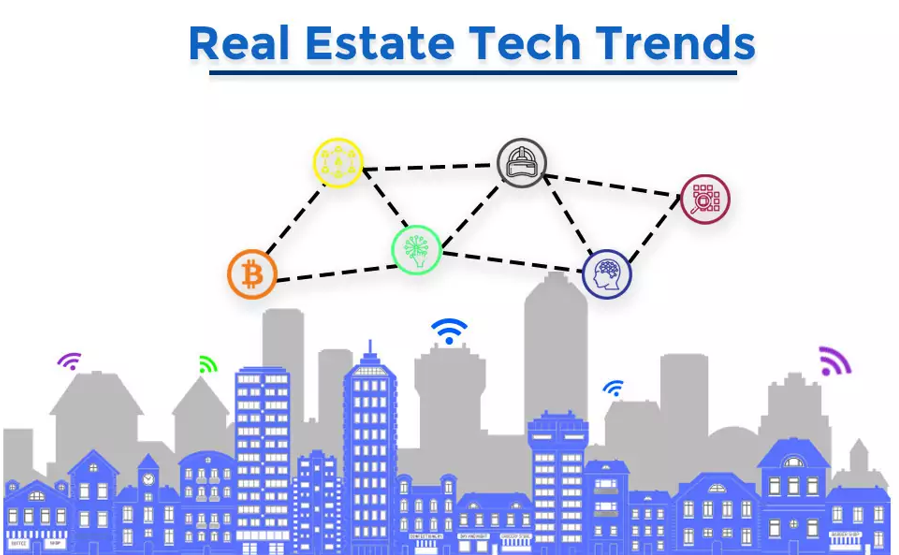Everything You Should Know About Real Estate Technology Trends 2022

Technology is rapidly advancing across all industries, including real estate. PropTech, or property technology, is changing the way we interact with our properties, whether for construction, property management, home services, buying, selling, or renting.
CREtech and REtech, which stand for commercial and real estate technology, are a part of proptech. As the name suggests, they refer to the technologies and software used in real estate applications and tools.
Such tools aided in connecting with prospects, streamlining time-consuming processes, and making jobs more manageable.
Real Estate: A Glimpse of the Market
Investments in prop-tech firms are seeing new highs today.
According to data published by a media platform, private equity (PE) investment in prop-tech firms increased 5% yearly from January to June 2022 to $270 million. Private funding for India’s proptech industry totalled $3.42 billion.
In addition, according to a recent Business Standard report, investments in proptech firms are expected to reach USD 1 billion in 2025, nearly doubling from 2020, as technology adoption accelerates in the real estate sector.
As of now, proptech in India has mainly been restricted to residential marketplaces and a few entities dealing in commercial real estate. Technology has, however, now infiltrated every aspect of real estate, from planning and design to construction techniques to property management and building facilities.
Proptech firms in India constantly leverage cutting-edge technologies such as artificial intelligence (AI), the internet of things (IoT), and virtual reality to enhance the customer and consumer experience throughout the real estate life cycle. These come along with emerging technologies such as metaverse and blockchain, which are slowly gaining traction in India,
This article examines the top real estate technology trends for 2022 and how they are reshaping the consumer experience.
1. Artificial Intelligence
The enormous amount of data collected daily via internet searches, social media, and connected devices is extremely valuable. AI can quickly sift through this data to identify trends and predict future movement. In real estate, this could mean the introduction of property valuation calculator as a tool for predicting market trends that affect housing/rental prices due to neighbourhood growth, past selling trends resulting in more accurately priced inventory.
Also, the increased adoption of cloud technologies has been a boon for real estate investors, who can now access property information from anywhere. According to statistics, 80 percent of top proptech firms are using cloud technology in one of three models: software as a service (SaaS), platform as a service (PaaS), and infrastructure as a service (IaaS).
In addition to taking the real estate sector online, cloud technology saves a significant amount of energy by reducing the reliance on manual labour.
2. Fractional Ownership
The trend of fractional ownership in commercial properties has developed dramatically over the last few decades. The concept is gaining traction in India because it alleviates the financial burden on a single investor or new-age CRE investors.
Fractional ownership has evolved dramatically over the years and is now an emerging trend in commercial real estate. The concept is gaining traction in India because it alleviates the financial burden on a single investor or new-age CRE investors.
In a nutshell, Fractional Ownership works by dividing the cost of a premium commercial property into multiple fractions, allowing people to participate in a real estate investment opportunity at a fraction of the cost. Fractional ownership has made it easier for young Indians to band together and purchase an asset, reap the benefits of the yield and capital gains at the exit, and sell their fractions whenever necessary.
3. Virtual & Augmented Reality
Virtual tours are on their way to becoming an integral part of the real estate industry. While it was critical during the pandemic year, virtual home tours will see increased adoption because they are convenient, time-saving, and simple to use.
Given the benefits, there will be an increase in interest in real estate, making home tours a breeze. Of course, virtual home tours will never replace in-person open houses; however, they will be a valuable resource for realtors and prospective clients who want to look at multiple homes before deciding which ones to visit in person.
4. Blockchain
The real estate industry is undergoing a disruptive evolution, with Blockchain serving as the driving force. Furthermore, blockchain in real estate can be used to verify encrypted transactions, enable workflow automation and ensure that financial records are not tampered with.
When used for large transactions, such as real estate sales, blockchain significantly reduces fraud and lets customers and realtors access more data after verifying their identities. Though it is still in its infancy, blockchain technology has the potential to change the way we negotiate and pay for real estate.
5. Mobile Apps
Mobile apps extend the convenience of the real estate industry, allowing customers to buy, sell, search for properties, and find agents. Now, buyers can virtually meet sellers and look for attractive properties, which makes the process more transparent and accessible.
Having a mobile-friendly site makes it easier to reach out to customers on the go. Thus, it’s essential to develop a real estate mobile app that enables customers to access the portal wherever and whenever they want.
Summing it Up!
Historically, India’s real estate sector was unorganized. But the emergence of proptech startups has disrupted the industry, making it more approachable, efficient and transparent for potential buyers or investors. Proptech players’ technological advancements are expected to create a digitally driven sector and sustain its position in the long run.



